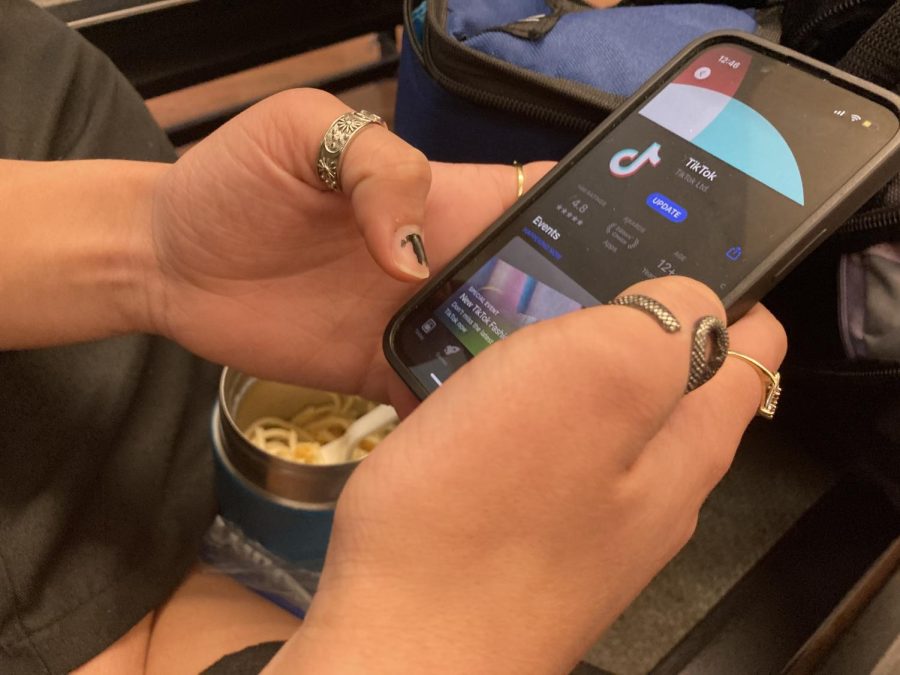TikTok is facing more controversy with the recent introduction of new California state bills to ban the popular app on government-issued devices.
“Legislators are concerned about TikTok because it’s owned by ByteDance, a technology company that’s based in China,” said Tejas Narechania, an assistant professor of law at the University of California, Berkeley. “And so policymakers are concerned that TikTok, for example, will be used to collect information about American users, and that that information will be shared with Chinese authorities.”
TikTok, formally known as Musical.ly, is a social media app that has grown in popularity in the past few years. According to the Digital Initiative website by Harvard Business School, Musical.ly had 200 million users in 2017. By 2022, TikTok had over 1 billion users.
This platform is designed as a “short-form mobile video” app, according to TikTok’s “about” page. Offering endless scrolling of people dancing and silly cats, this platform appeals to people of all ages. An overwhelming number of teens swarm the app, but in fact, Pew Research Center reports that 21% of TikTok users in the U.S. are adults.
California lawmakers who are worried about Chinese spying introduced two laws in January. SB 74 and AB 227 would ban certain social media apps on state-owned devices. Apps from countries of concern, including China’s TikTok, would not be allowed to be downloaded on any phones, computers, or other devices owned by the state. This could include teachers’ desktops, lawyers’ phones, and more.
“Apps can collect a lot of information about you, depending on how they’re built and the permissions that are granted to them. They can collect information about your location, other files on your phone and devices, your contacts, and more. And it is precisely this wide range of access that gives rise to the policymakers’ concerns,” Narechania said.
U.S. Congress already passed the “No TikTok on Government Devices Act” in December 2022 to address cyber security concerns, taking effect on March 15.
Just this week, a dozen senators introduced another bill called the “Restricting the Emergence of Security Threats that Risk Information and Communications Technology (RESTRICT) Act,” which would expand the federal government’s ability to enact bans if there’s a cybersecurity threat.
On March 7, 2023, the White House released a statement reporting that the new bill “would empower the United States government to prevent certain foreign governments from exploiting technology services operating in the United States in a way that poses risks to Americans’ sensitive data and our national security.”
Before former president Donald Trump left office, he attempted to ban TikTok from all U.S. phones. Trump’s executive order stated, “The United States must take aggressive action against the owners of TikTok to protect our national security.” But Biden revoked it when he got into office.
Almost 30 U.S. states, along with Canada and the European Union, have now restricted TikTok in some capacity.
Similar to California, New York does not currently have a bill in place but is considering restrictions.
“New York State does not have a TikTok ban, and even if they did on state devices, we wouldn’t at New York University (NYU) be affected by that,” said Zeve Sanderson, the executive director at NYU Center for Social Media and Politics. “And so what we’ve seen is that there’s a huge cost to the research community with the way that the bans are rolling out at the state level. When they say that state devices can’t use TikTok, that also means that researchers at those institutions can’t research what’s happening on TikTok. We actually have these sort of two competing values that are at odds with each other,” Sanderson said.
Though these two California bills do not affect non-public employees, it is possible that greater restrictions could be coming to the average citizen.
“If the federal government perceives a strong and wide threat, then it may make sense for the federal government to act, subject to other limits, of course, such as the First Amendment. But federal action can sometimes take a while, and states can sometimes be more nimble. And so states might want to act too, especially to protect state and local interests such as competition to local industries,” Narechania said.
Some teens, whose cohort makes up the majority of the users on the platform, feel far removed from the threat.
Not all teens are suspicious of TikTok. They may not keep up with the news to understand why there is so much controversy about the app, or they may not believe that their privacy is at risk.
“Anybody can see the stuff you post, not just the Chinese government, who probably doesn’t even care. It’s just basic internet safety. If you stay by that, you’re fine,” said freshmen Madeline Howard when talking about her favorite app, TikTok.
Howard and her friend Elise Latimerlo, another freshman at Carlmont, agree.
“I’m not too worried about safety on TikTok because I know that if worse comes to worst, I can just delete my account and make sure I’m safely off of it. It’s just like any other social media. There are always risks,” Latimerlo said.












